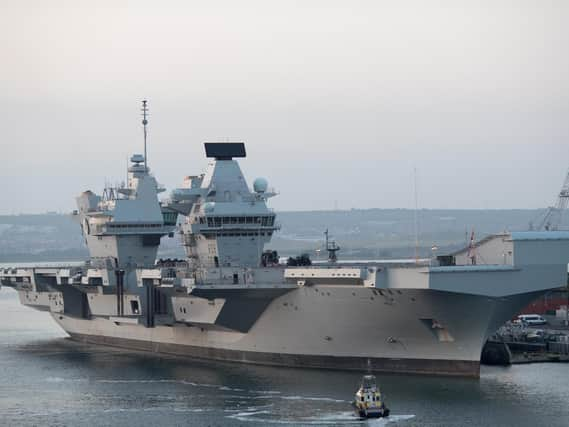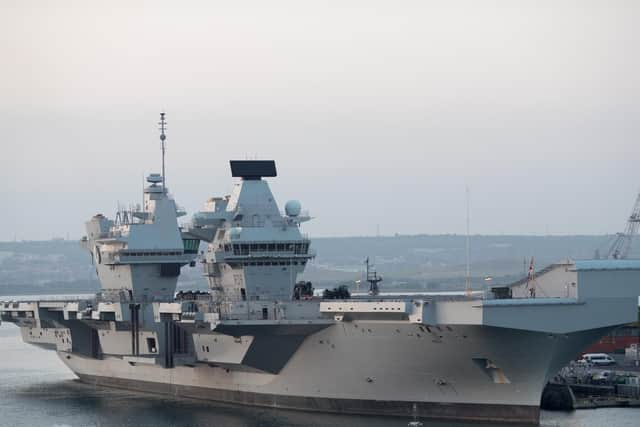HMS Queen Elizabeth and HMS Prince of Wales: Babcock to axe 150 jobs at shipyard where Royal Navy’s aircraft carriers were built


The union said Babcock will make the redundancies at its Rosyth yard on the Firth of Forth in Fife.
The shipyard was the site where the Royal navy’s new aircraft carriers HMS Queen Elizabeth and HMS Prince of Wales have been built.
Advertisement
Hide AdAdvertisement
Hide AdAssistant general secretary Steve Turner said: ‘The men and women whose skills built the UK's two new world-leading aircraft carriers at Rosyth are at risk of being lost for a generation in a blow to the Scottish economy and UK shipbuilding.


‘Today's announcement of job losses will send shudders down the spine of shipyard workers across the UK who in recent months have endured the threat of redundancy on the Mersey and the closure of Devon's Appledore shipyard.
‘The fear is that these job losses at Rosyth could turn into a flood and the industry left with a yawning skills gap unless the UK Government starts supporting UK Plc by delivering on a shipbuilding strategy that guarantees the Royal Navy's new auxiliary ships are block built in UK shipyards using British steel, in addition to bringing forward work on the Type 31e frigate for export around the globe.
‘It would be a gross betrayal of a skilled workforce and British manufacturing if the Government continued with its obsession to award such work to overseas shipyards and deny manufacturing and communities in the UK the economic benefits that building the Royal fleet auxiliary ships would bring.’
Advertisement
Hide AdAdvertisement
Hide AdA Babcock spokesman said: ‘The prospects for Babcock's operations at Rosyth remain strong with great opportunities.
‘Last year we began the process to reshape our business in order to remain competitive and take on new challenges, as the large-scale design and build phase of the Queen Elizabeth carrier programme reaches completion.
‘Today's workforce announcement is a continuation of the need to right-size our organisation.
‘Having assessed our current workload and medium-term opportunities, we anticipate the loss of around 150 specific roles which are no longer needed in line with the rundown of the programme.
Advertisement
Hide AdAdvertisement
Hide Ad‘Our employees remain our priority throughout this process. We understand how unsettling this can be and will work closely with those affected and our trade union representatives through this consultation period to redeploy or relocate as many employees as possible within our wider organisation and support those who may wish to take this opportunity to move on.’
Ross Murdoch, GMB national officer, said: ‘Once again we are paying the price for the Government's betrayal of UK shipbuilding.
‘Rather than ensure a steady drumbeat of shipbuilding orders that keep the industry alive, the Conservatives seem content to let UK shipbuilding die out in the name of the free market.
‘Appledore is on the brink of closure, Cammell Laird is slashing jobs and now this. When will the Government step in to save our centuries-old shipbuilding heritage?’
Advertisement
Hide AdAdvertisement
Hide AdGMB Scotland organiser Gary Cook said: ‘These redundancies stress the urgent need for the UK Government to ensure the three Royal Fleet Auxiliary (RFA) vessels are built in British shipyards, including Rosyth.
‘The wind down of the aircraft carrier contract creates a vacuum at Rosyth with no significant manufacturing orders on the horizon.
‘Let's be clear what this means, peak production at Rosyth sustains over 3,800 jobs and generates over £100 million in wages - that's what's on the line.
‘Maintenance programmes for warships will sustain some levels of employment in future but it's a feast and famine existence for yards like Rosyth, which needs large-scale shipbuilding to realise its full potential.’